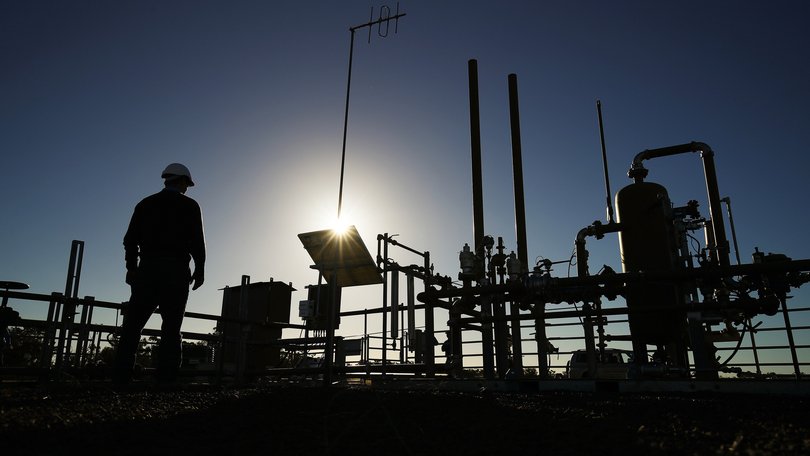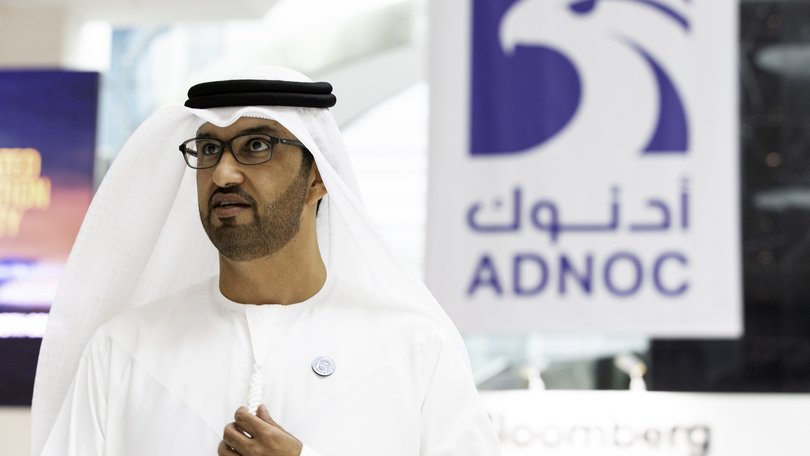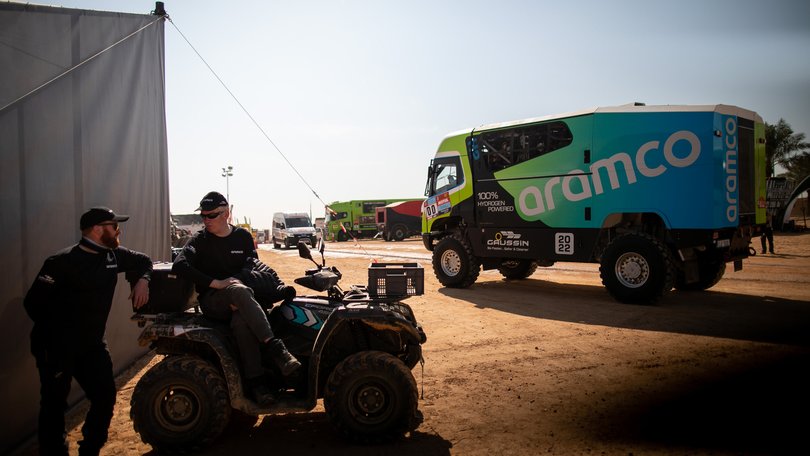Power grab during Middle East conflict amps up fears over Australia’s energy security
The oil-rich UAE’s takeover bid for a major Australian gas supplier during the Middle East action raises a red flag over the energy transition.

The $30 billion bid for Santos energy by an arm of United Arab Emirates government wasn’t timed with conflict in the oil rich gulf.
But it highlights how important the energy transition is becoming, and the battle for assets that assure energy security as that transition becomes messier.
The bid by the Abu Dhabi National Oil Company, is the state-owned firm’s latest in a global shopping spree as it looks to pick up assets on the cheap to diversify its revenue streams away from oil.
Sign up to The Nightly's newsletters.
Get the first look at the digital newspaper, curated daily stories and breaking headlines delivered to your inbox.
By continuing you agree to our Terms and Privacy Policy.Adnoc has looked into a future where the increasing supply of cheap electric vehicles, and the more than 90 per cent fall in the price of solar panels is presenting an existential threat for oil demand.
China, the largest consumer of oil and gas in the world has already passed peak oil consumption, according the to International Energy Agency, and with 50 per cent of new car sales electric, is starting to see demand decline for petrol.
It has been electrifying its economy at a furious pace and by 2023 surpassed both Europe and the United States in terms of electrified transportation. It now accounts for roughly one-third of global electricity demand and leads the world in renewable capacity, with forty-three per cent of installed solar and wind infrastructure.
China’s pursuit of energy independence has made renewables so cheap elsewhere that it has hastened the transition to Net Zero by other countries, particularly in Europe.
But the race to renewable energy has its own complication.
The world is accelerating into what the International Energy Agency has called a new Age of Electricity, with global electricity consumption forecast to grow six times faster than overall energy demand this decade. Electrification trends, from EV adoption to AI-driven data centres, are transforming not only how energy is consumed but also how it must be supplied.

At the same time, the surge in renewables such as solar and wind has reshaped power generation. Since 2010, global solar capacity has grown more than fiftyfold and wind sixfold, ushering in a new era of low-cost, variable energy.
But the collapse of the Spanish grid has demonstrated a major energy security challenge: how to ensure modern power systems remain stable and resilient in the face of more volatile supply and increasingly concentrated demand. That’s now a strategic imperative for governments, not just a technical hurdle, the IEA said.
Crucially, flexible and dispatchable energy sources, including natural gas, will be needed to stabilise grids as renewable penetration grows. The IEA warns that short-term flexibility needs are set to more than double by 2030, and that meeting this challenge will require not just storage and demand response, but also firm generation capacity to fill the gaps when the sun isn’t shining and the wind doesn’t blow.
Which is why Adnoc is stalking Santos and Mitsubishi is in talks to acquire US natural gas producer Aethon Energy Management for about $US8 billion.
Saudi Arabian state oil company Saudi Aramco is also in on the act, looking to spend $US100bn on a develop a new shale gas field close to the Persian Gulf to increase the kingdom’s natural gas production by more than 60 per cent by 2030. Saudi Aramco could take an equity stake in Woodside’s major US gas project in Louisiana and purchase gas from the facility, recently signing a nonbinding agreement.

Speaking Monday via video at the Energy Asia Conference in Kuala Lumpur, Saudi Aramco’s chief executive Amin Nasser said the conflict between Iran and Israel highlighted the role oil and gas plays in times of crisis.
“(History has) shown us that when conflicts occur, the importance of oil and gas can’t be understated,” Mr Nasser said. “We are witnessing this in real time, with threats to energy security continuing to cause global concern.”
He said renewables were still far away from meeting global energy demand, making fossil fuels a critical part of the mix.
“As a result, energy security and affordability have at last joined sustainability as the transition’s central goals,” he said.
Treasurer Jim Chalmers, speaking on Sky News said he was unwilling to pre-empt what the Foreign Investment Review Board advised.
“Obviously it has the potential to be a very substantial transaction, tens of billions of dollars associated with that in a sensitive part of our economy,” Dr Chalmers said.
“We’ve made it clear over a long period of time that those considerations of security, economic security and national security are very closely intertwined and so the Foreign Investment Review Board weighs all of that up.”
While the Santos takeover will be assessed against broader national interest criteria, the real focus is likely to be Santos’ role in east coast domestic gas supply.
Tony Wood, energy program director at the Grattan Institute, said this was very different from approving the takeover of a department store or a mining equipment company.
“This is a company whose core business is extracting and selling Australian resources,” he said. “The question for FIRB will be whether that continues to serve the national interest under foreign ownership.”
Much of the scrutiny will fall on Santos’ stake in the Gladstone LNG joint venture in Queensland, where it holds a 30 per cent share. That project has long been criticised for overcommitting gas to exports, drawing supply from elsewhere and sparking concerns of a domestic shortfall.
“That’s the project most likely to raise red flags,” Mr Wood said. “It’s been blamed for sucking gas out of the domestic market, and the government will want to know that won’t get worse under new ownership.”
The government has the power to extract informal supply commitments from major exporters via the Gas Code of Conduct and the Australian Domestic Gas Security Mechanism. Mr Wood said a deal of this size could be an opportunity to formalise and potentially strengthen those commitments, even if the power to force outcomes remains limited.
“You can extract commitments like keeping the head office in Adelaide, but it’s much harder to enforce ongoing supply behaviour,” Mr Wood said.
Ultimately, the final decision may turn on whether the buyer can demonstrate a credible, enforceable commitment to Australia’s energy needs, not just in volume but in crisis responsiveness.
“The real issue is not how much gas we have, but whether we can access it particularly when things go wrong,” he said.
One of the sleeper issues surrounding the Santos deal is whether a foreign takeover would sharpen focus on Australia’s relatively low tax take from gas exports. Mr Wood said the Petroleum Resource Rent Tax (PRRT) had long been viewed as inadequate, and a major transaction could reignite debate over whether the tax was working.
“Australians are not getting, I would argue, a fair share of the fair return from the fact we’re allowing this company to develop and export that Australian asset. It’s even more so if we’re now going to put that asset in the hands of a foreign-owned company,” he said.
“The question is whether this would open up that conversation, because there are other companies who are hit by the PRRT who would scream blue murder if they tried to make it retrospective.”

